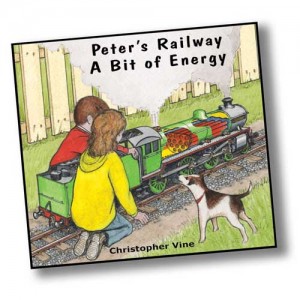A Bit of Energy Resources
School Resources for “A Bit of Energy”
These resources are all PDF documents which you can download to your computer. They are free to use for schools.
The documents can be viewed on-line or saved to your computer – so there is no need for an internet connection during lessons.
(If you use the projector PDFs directly in your browser window, you might need to set to Fit Screen or Full Screen.)

Curriculum
The book was not written as a text book to cover specific topics from the National Curriculum, however many topics are introduced such as:
How energy is converted from one form to another, how steam is created, how it is used, photosynthesis and where coal comes from.
National Curriculum
England and Wales Year 4 programme of study
Science-States of matter
Statutory requirements
Pupils should be taught to:
compare and group materials together, according to whether they are solids, liquids or gases
observe that some materials change state when they are heated or cooled, and measure or research the temperature at which this happens in degrees Celsius (°C)
identify the part played by evaporation and condensation in the water cycle and associate the rate of evaporation with temperature.
Notes and guidance (non-statutory) Pupils should explore a variety of everyday materials and develop simple descriptions of the states of matter (solids hold their shape; liquids form a pool not a pile; gases escape from an unsealed container). Pupils should observe water as a solid, a liquid and a gas and should note the changes to water when it is heated or cooled.
Curriculum for Excellence
Science-Energy sources and sustainability
Learners explore types, sources and uses of energy and develop their understanding of how energy is transferred and conserved. They consider the relevance of these concepts to everyday life. They explore the nature and sustainability of energy sources and discuss benefits and assess possible risks to form an informed view of responsible energy use.
First P2 – P4
I am aware of different types of energy around me and can show their importance to everyday life and my survival. SCN 1-04a
Earth’s materials
Learners develop their knowledge and understanding of substances that make up the Earth’s surface. Properties, uses and methods of extraction of such materials are explored. Opportunities exist to discuss the importance of carbon compounds derived from crude oil to our lives.
Second P5 – P7
Having explored the substances that make up Earth’s surface, I can compare some of their characteristics and uses. SCN 2-17a
Sign up to receive our newsletter
Early access to new releases, fun activities & more!
